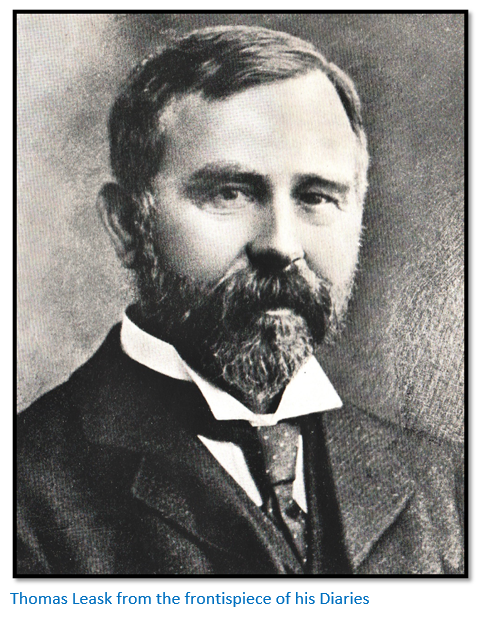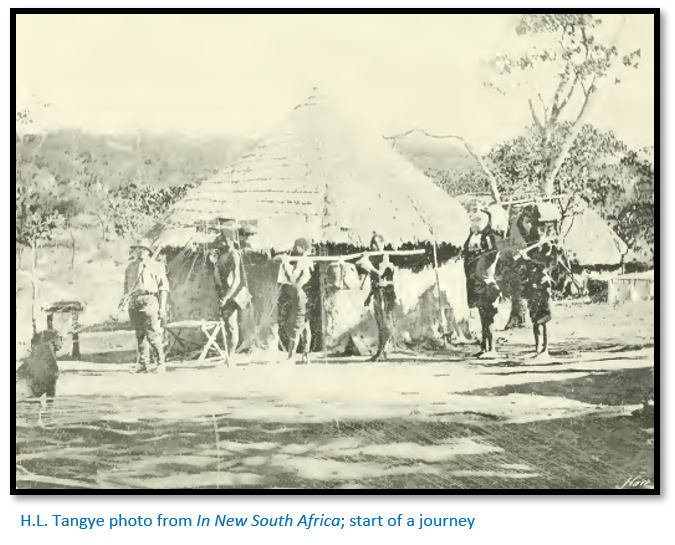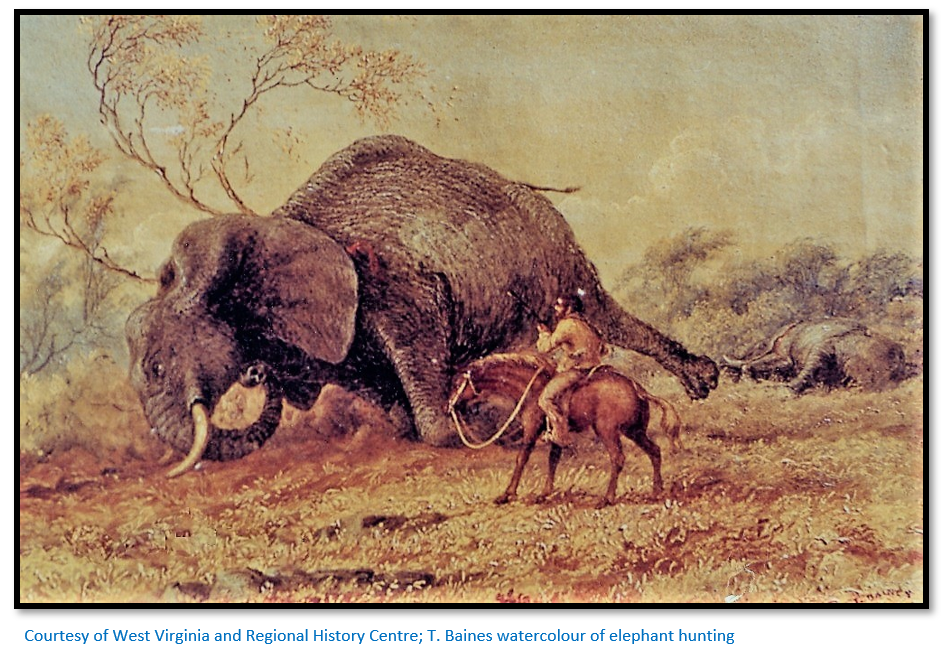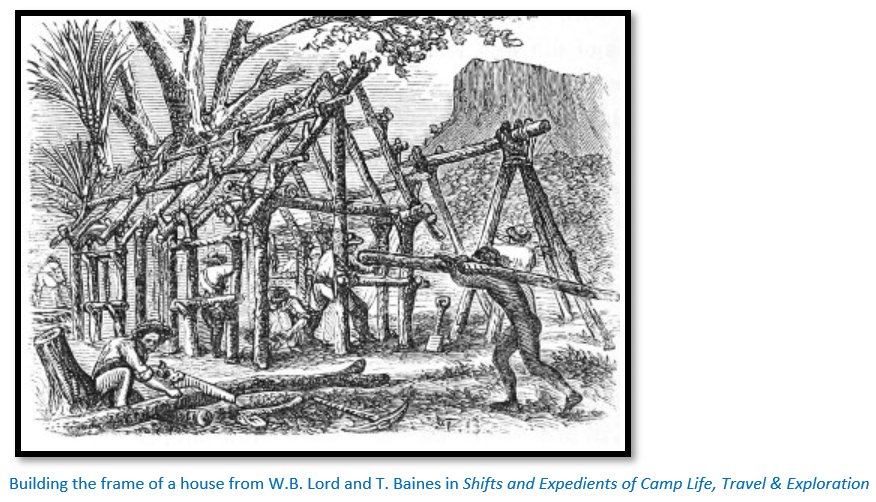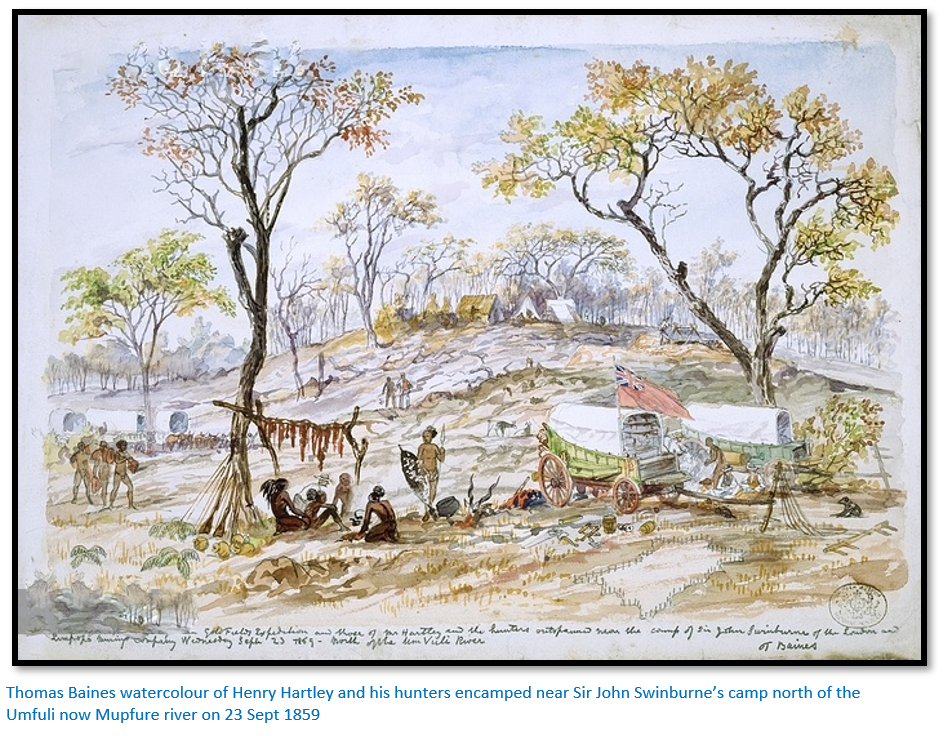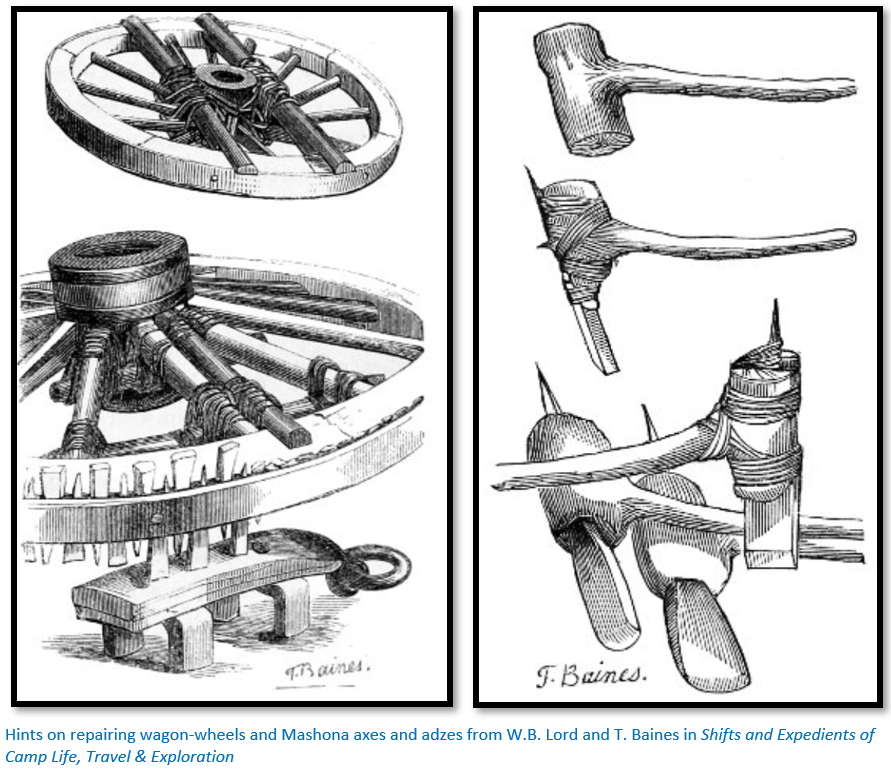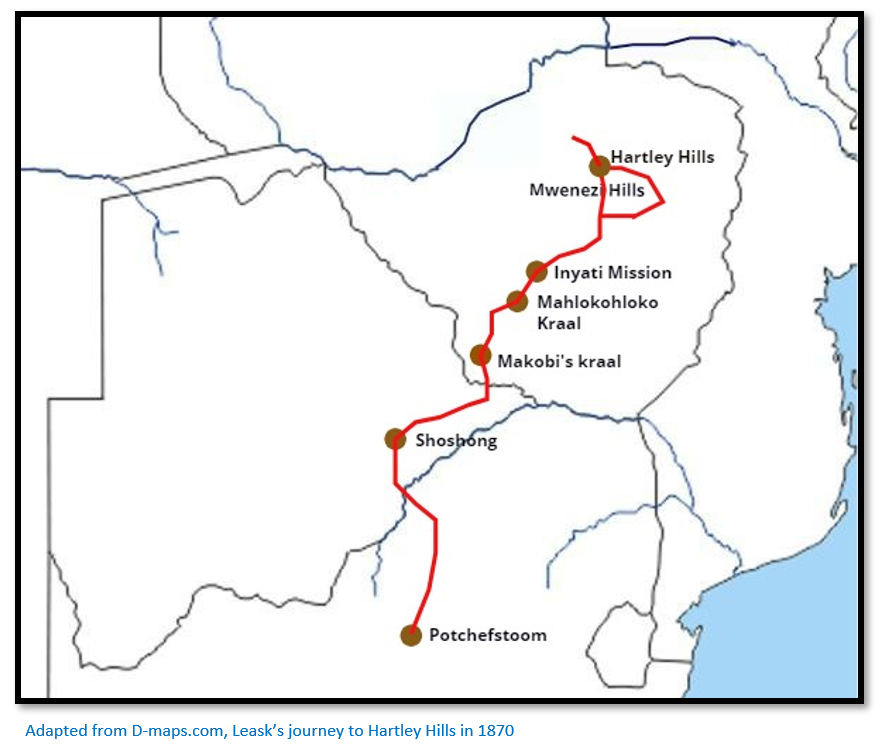Thomas Leask (1839 – 1912) and “my last hunt” to Hartley Hills in 1870
Background
For biographical details see the article Thomas Leask’s Life and Diaries describing Matabeleland and Mashonaland in the 1860’s under Harare on the website www.zimfieldguide.com
For other articles on Thomas Leask on the website see:
- Thomas Leask and his first two hunting trips into Matabeleland and Mashonaland in 1866 and 1867 under Bulawayo on the website,
- Thomas Leask’s two journeys to the Zambezi in 1868 and 1869 under Matabeleland North on the website.
This last journey in 1870 was originally written up in pencil by Leask in three small pocket books 10 x 7cm (4 x 2.75 in) and about 1 cm (.375 in) thick. The pocket books were then re-written by Leask in ink onto quarto paper.
The journey to Hartley Hills in 1870
Jan – starts from Potchefstroom for Matabeleland
Mar – enters Matabeleland
Early April – at Lobengula’s kraal.
11 April – Thomas Leask, Thomas Maloney, Henry Byles, and Piet Van der Berg leave Gubulawayo each with a wagon and span of oxen.
2 May – they reach the Umfuli, now Mupfure river where they meet the Gifford and Jennings parties. [James Gifford, John Jennings, William Saunders, George Jennings, H.M. Gilloway[i] and Stoffel] The last three suffering from fever. Maloney and Van der Berg leave their wagons two hours trek away from the Umfuli. Leask stays two days at the Umfuli camp until Gifford also goes down with fever when he takes his and Gifford’s wagons and treks back to Maloney and Van der Berg, but the others choose to remain.
5 May – William Hartley arrives from Thaba Insimbe (Iron Mine Hill) and Leask tries to persuade them to trek to higher country in the south-east but they prefer to continue on and hunt for elephant.
7 May – George and John Jennings, Saunders, Gilloway and Byles leave the Umfuli camp for the Hunyani, now Manyame river.
9 May - Maloney and David Jacobs accompany Willie Hartley, son of Henry, and James O’Donnell who follow the first hunting party towards the Hunyani. H.M. Gilloway dies of fever.
10 - 14 May - Leask, Van der Berg, Gifford and Stoffel (the last two both sick) move back down the Hunter’s Road from the Umfuli to higher and less malarial ground. The days are very cold.
15 May – Leask and Van der Berg travel back to the Umfuli and go east to a Mashona village to barter for chickens, sheep and pumpkins.
16 – 17 May - they are on still on the Umfuli searching for provisions, the weather very cold and wet.
21 May – they reach a Mashona village on the northern bank of the Umfuli hidden in the rocky kopje and defended with dry-stone walling. “The country about here is very wet. It is high and in many places rocky, but springs of water all over. It is in such places that the Mashona live, as there they can cultivate their rice of which they grow a considerable quantity. The rice gardens are in the low swampy places…Their corn and mealie gardens are on the higher ground. They also grow small grain, commonly called muunah,[ii] ground-nuts, beans and an abundance of pumpkins, water-melons, etc. The Mashonas are an ingenious industrious people, more so than any other natives I have seen. Their iron work is good, also their weaving of sheets, bags, nets, etc., from cotton and bark. They are also advanced in the higher art of music, but they are in continual dread of the Matabele and they have no paramount chief.”[iii]
“Bought several bags of mealies, some nice pumpkins, etc. Red beads were all the demand. The headman sent us some mealies and beer, with an apology of allowing us to sleep hungry. Took a small present and went to visit him.”
23 May – “…That evening some of Thomas Maloney’s natives came to us with a letter which told that he – Tom – Will Hartley and Jim O’Donnell were sick of fever; the two latter were very sick.” The letter requested help and medicines as Hartley and O’Donnell were now camped back on the Chirundazi stream.
24 - 25 May - Leask and Van der Berg travel back with the food they have bartered.
26 May - Leask leaves the outspan at sunrise on a horse and reaches the sick party at sunset on the Chirundazi stream. “He (Hartley) was extremely weak and tho’ he knew me and spoke somewhat sensible, he looked wild. Jim (O’Donnell) was tossing about in great pain and seemed sensible. He said his bowels had not been open for three days. Tom (Maloney) was spitting continuously and calling for water. Gave them all calomel and antimonial powder and two hours afterwards jalap and rhubarb. They slept a little.”
27 May - Leask did his best with the medicines he had and the patients began to rally. “Gave them some salts and Jim at his own request two Livingstone pills. Will I give no more purgatives. Shortly after the medicine operated on them all and they seemed much revived, but Will was very weak. They asked me to move them up towards our wagons [to join Van der Berg, Gifford and Stoffel] and as they seemed to think it would do them good, I inspanned after they had all supped a little arrowroot and trekked very gently for a short distance. They seemed a little better, but at sundown Will became insensible and unable to move.”
29 May – “He [Will] lingered til Sunday at midday and then died the same evening.”[iv] James O’Donnell died the same day evening. Of the thirteen Europeans hunting on the Umfuli river in 1870 seven went down with malaria and three died.
30 May - Leask gets the party to the wagons and they rejoin Gifford, Van der Berg and Stoffel. “It was a very trying journey.”
1 June – the wagons are moved to still higher ground and Leask, Gifford and Maloney are joined by Thomas McMaster and his wife and three children, one of whom is a two month old child; they left Tati on 15 April.
4 June – the wagons are moved to still higher ground. They decide to hunt to the south-east in the Mwenezi hills and the headwaters of the Ngezi river.
9 June – They halted for the night on the banks of the Ngezi river. “Found fresh elephant spoor, followed it about half-an-hour when we saw two bulls on the edge of thick bush…They soon smelt danger, wheeled round, threw up their trunks and sniffed the wind…Then it was up and at them…They were soon wounded and easily shot.” Leask later kills a cow rhino; “I wanted some hide for a band for my broken wagon wheel…She was fat and we had a good supper off her ribs”
11 June – the last three or four days have been very cold; if it continues we will require to look for a more sheltered spot…The cold seems rather too severe for our invalids. Gifford has had ague[v] again and Stoffel’s cough is very troublesome.”
12 June – “…Oh, how I could enjoy a Scottish Sabbath and Scottish sermon and then the Scottish music, how sweetly would it sound! Tho’ some ten long years have passed since I heard it, it comes vividly before my mind.”
13 June – they kill seven elephants.
21 June – George and Swithin Wood arrive at their camp on the Ngezi river. Both are still weak from fever. They were the first party into Mashonaland in 1870; George’s wife, child, mother-in-law and Paul Jebe died from fever although they all stayed on high ground. “This year has given us all a lesson which will not soon be forgotten.” They move to Thaba Insimbe (Iron Mine Hill) before passing through a gorge towards the Umsweswe river.
1 July – “went out hunting. Returned on Saturday [next day] without having seen a fresh elephant spoor. Saw the spoor of two wagons which had gone down to Umfuli. Suppose them to be Baines.” [Thomas Baines]
4 July – “Tom, Gifford and Stoffel are complaining today. They blame the camping place, but I think a plum pudding which Mrs McMaster made yesterday has something to do with it.”
5 July – “This morning we inspanned and trekked down in the direction of the Umfuli…Our camp is a large one, seven waggons, over a hundred trek oxen, thirteen horses, a flock of sheep and goats, about fifty fowls, and nearly the same number of dogs, big and little, eighty natives at least and seven white men, [Leask, Gifford, Van der Berg, Maloney, McMaster, George and Swithin Wood] one white woman and three children.”
6 July – “Went out in search of elephants. Crossed Umfuli, when Gifford and Tom [Maloney] returned to the wagons feeling too weak to proceed. In crossing the river my horse stuck in a quicksand and could not extricate itself. I had to scramble from his back into the water and like the horse I sank in the sand. We succeeded in getting back and found a better drift a few hundred yards lower…I have ridden seven days from morning to night and never seen one fresh spoor…The wonder is where all the elephant have trekked to, as the whole country is tramped with spoor of three months’ age or so. They have evidently scented danger and be taken themselves to safer quarters.”
“After we outspanned Tom Maloney and I rode down to the old Mashona diggings on the north bank of the Umfuli where we found Mr Baines and two other white men [Baines’ cousin William Watson and his secretary Robert Jewell] in the employ of the [South African Goldfields Exploration Company] with two wagons. They arrived ten days ago and are putting up a house. Mr Nelson is expected with some diggers and their intention seems to be gold digging in these regions. They have named their camping place Hartley Hill. They may find payable gold, but some of them are certain to find graves if they remain the whole year. I am afraid their shafts and drives will turn to charnel houses.
Mr Baines was much surprised when we told him of the deaths and sickness of our friends and companions.”
9 July – “On Saturday we moved to the vicinity of Mr Baines’ encampment and we encamped under a small hill which we have named Constitution Hill because of my recommending those who are convalescents to climb it every morning. It is divided from Hartley Hill by a small river named [Chimbo] Mr Baines, as a tribute to the memory of our departed friends has kept the Union Jack half-mast high for some days.”
13 July – “A boy belonging to Jennings who was in the fly with Rolf [?] and who returned with him sick to our wagons left on Monday to go in search of his master. He returned yesterday bringing a letter from Jennings. They are at the Kanyani river[vi] [Manyame] and have all had fever but are recovering with the exception of H. McGilloway [H.M. Gilloway] who died on the 9 May. They sent over for some medicines and all I could let them have was a little salts and castor oil.”
18 July – “Very cold and keen frost this morning. Could not get away from the fire. Started a-hunting, Gifford, George Wood and I, Tom McMaster and Jacobs with one wagon towards Kanyani. On Monday we shot nothing, on Tuesday we followed elephant spore from morning til late in the afternoon, found them and made a mess of it. Shot only one small bull. The flesh was much required.
Kanyani [now the Manyame] is a large river, that is in comparison with other rivers in this country. I think it has more water than the Umfuli. At this place it runs a couple of points or so west of north. [possibly west of present-day Darwendale in the Zvimba Tribal Trust Lands] The course is very rocky and there is a great deal of quartz about, both in the river bed and some distance from the banks. The quartz may be gold-bearing, but it looks too white. However I know little or nothing about gold-fields…”[vii]
23 July – Leask is still on the Manyame river. Gifford and Wood leave Leask to follow elephant spoor. “As a last resource I stood on the river bank and employed myself in the edifying pastime of throwing pebbles at a rock til my arm was wearied…now I have set the boys to make a sleeping-place and composed myself with sundry pipes of tobacco to write this.”
24 July – “We walked for about three hours, when we came to Byles’ wagon.”
25 July – “Early this morning I got Wood’s horse and started over to Umfuli to bring Gifford’s and Wood’s wagon. It was very cold…I reached the wagons about 4pm. J and G Jennings had gone hunting and left their companion to take care of himself, which he was very far from able to. It is shameful how selfish and unfeeling some people are…Mrs McMaster was anxious to get over to Kanyani to her husband and asked me to help them along with their wagon so far…so we started with five wagons. Mine I left with a boy to look after it.”
26 July – “It was bitterly cold with a strong penetrating wind and I did my utmost to compel all who were sick or inclined to be so, to keep themselves well wrapped up, but it was useless attempting. They were careless but are reaping the fruits. Saunders got the ague about sundown and Wood and Stoffel have a cold. Some of them would weary the patience of Old Job himself…
I might say for all of us, for out of twelve of us white men there is only one really healthy, viz., Jacobs and he is a Boer. Nine out of the twelve have had fever this year…hunters are generally considered strong hard people. It is certainly not correct in this instance for I am certain that wet feet or a little extra exposure would knock up any one of us…Well, after all, this is a miserably rough life for anyone who has passed the sanguine, hot-headed adventure-loving stage of life.”[viii]
In going down to the Manyame for a bath, Leask nearly stepped on a python, which he calls a boa-constrictor. After some trouble killing it he has it skinned and his native servants tell him it is very lucky to kill one of these snakes and say he shall shoot lots of elephants. “Of course I don’t believe that killing a snake has much to do with elephant shooting, but I hope they may be correct.”
2 Aug – “One of Woods wagons is to start today to buy corn from Mashonas who live among the hills between Umfuli and Kanyani. The chief’s name is Magondi.”
4 Aug - Leask hears that Lobengula has taken action against those izinDuna who opposed his claim. “A Mashona who said he had just come from the Matabele and brought news that the Chief had been fighting with two of the rebel kraals and killed forty people of each.” Leask’s servants are anxious to go home to see how matters stood. “In my opinion they only want to make it an excuse for leaving and really they are glad they were out of the way of danger for they are all only Mashona slaves.”[ix]
Van der Berg returns from across the Manyame and has shot ten elephants. Lions have become troublesome on the Umfuli and eaten three oxen that were left to roam.
9 Aug – “Woods wagon returned from the Mashonas yesterday…they got only four bags of mealies; they also bought a little ivory and one quill of gold dust; near Magondi’s town they saw extensive quartz diggings.”
14 Aug – “We expected to have a nice breakfast this morning of ostrich eggs made up into pancakes, but our eggs proved to be too far gone chickenwards. McMaster found a nest last night; there were twenty-two eggs.”
16 Aug – having found spoor they followed and shot three cow elephants and calves but Leask thinks “the elephants seem to have trekked out of this. They have been a good deal shot and the country is nearly all burnt black.”
23 Aug – “Arrived at Umfuli and were surprised to find Mr Hartley there.” Hartley tells Leask that Lobengula has taken action against those izinDuna who opposed his claim. “After a hard fought battle the rebels were conquered and their leaders killed. Women and children and those of the men who laid down their arms were spared.” In later actions such mercy would not be shown by the amaNdebele. “The chief rebel town, where the battle took place, was burnt to ashes and is never again to be built, nor its name mentioned. The two other towns were not destroyed and all the people who sue for mercy have been allowed to live with the exception of the ringleaders.”
Leask continues: “Some of the chiefs (of Lobengula’s party) wished the white people to assist them, but the chief Lobengula would not hear of it. He said it was purely a Matabele quarrel and white people who came in peace should not be compelled or even allowed to take part in the fight.”
Leask says of Lobengula: “He is a fine sensible native and in civilisation far in advance of his late father. Yet, old Moselekatze was a genuine friend and lover of white people. The old man was behind his time however, for he clung to the old savage rites and customs and indulged in plunder and bloodshed. He was a strange mixture of the warm-hearted man and the bloodthirsty savage. His life had been one of war and in old age, when no enemies were near to molest him, he sent his people to plunder the Mashonas.”
Henry Hartley welds Leask’s wagon tyre whilst Leask makes a new disselboom.
29 Aug - Leask takes Henry Hartley, William’s father, to his son’s grave accompanied by Thomas Baines and Robert Jewell. Leask writes: “Exactly three months ago today we laid him under a Gondo[x] tree and covered his grave with bushes to protect it from beasts of prey, carved the name and the date, and could do no more. Last November when father and son parted at Tati, William a young man, was full of hope and strength, while the old man was weak and emaciated with three broken ribs which he got by a toss from a rhinoceros and today age and white hairs are weeping at the grave of youth…For his son’s sake the old man though still weak came in this year. A few miles from here J. O’Donnell is laid…Mr Baines took a sketch and Mr Jewell a photograph of the grave, after which we parted.” [See the article The search for Willie Hartley’s grave under Mashonaland West on the website www.zimfieldguide.com]
1 Sept – Leask, McMaster and Gifford return along the Hunter’s Road; the first two individuals hunt on foot for 80 kms (50 miles) down the Umniati now Munyati river below the drift. They are joined by David Jacobs and McMaster leaves for Inyati to meet his wife and daughter. The elephant have learned by now that the tsetse-fly is deadly to their hunter’s horses and retreated into the bush; some of the hunters such as Selous will follow the elephant on foot but most of the old hunters consider this too dangerous.
10 Sept – “crossed over to Sebakwe.”
13 Sept – “There are some large hills a couple of miles above the junction of Sebakwe and Que Que [rivers] and the former river runs through a precipitous romantic-looking gorge in those hills. We climbed the largest hill and viewed the country around.”[xi]
14 Sept – “Walked four hours and got to the wagon drift [at the Que Que river] but found no wagon there…A marauding party of Matabele passed the wagons last week. They had been to the Mashonas [Lomagundi district] other side of Umfuli, where we went to buy corn. They has some three hundred head of cattle, a great number of sheep and goats and several Mashona women and children. All the men they could get at, I suppose, they killed.”
19 Sept – Leask, Gifford and Jacobs reach the Gwelo river. “Andrews came to the wagons with the feathers of two ostriches, a male and female…Those fair ones who flourish their borrowed plumage are little aware of the patience, perseverance, schemes and hard-heartedness which is required to despoil the fleet and keen-sighted ostrich of the feathers with which they adorn themselves.”
20 Sept – “Trekked over to Vungu and Wednesday 21st came to Shangani” [rivers]
24 Sept – the party reaches Inyati Mission where they meet Reverend John Boden and Elizabeth Thomson who have been sent by the London Missionary Society to replace Thomas Morgan Thomas. Leask rages against the LMS who send such unprepared novices to such a remote posting without any medical training.
29 Sept – the party leaves Inyati
1-3 Oct – stay at Gubulawayo; “The King was very cordial and professed to be sorry that sickness had made such havoc among the hunters.”
21 Oct – Jacobs leaves them at John Lees.[xii] Leask and Gifford leave Tati settlement which is almost deserted with only three stores and six people and stop at the Shashe river until 30 Oct. Leask states they are crushing about three-quarters of a ton of quartz daily and getting 1 – 2 ounces per ton. F. Griet, the German mining engineer for the London and Limpopo Mining Company has sent down 40 ounces of gold.
4 Nov – arrive at Shoshong where he writes: “There were a dozen white traders in the place, all looking as if a change would be advisable.” Leask added in a later note: “I journeyed down to Potchefstroom, where I disposed of my ivory and other goods and so ended my hunting days.”
References
W.B. Lord and T. Baines. Shifts and Expedients of Camp Life Travel and Exploration. Horace Cox, London 1871
E.C. Tabler. Pioneers of Rhodesia. C. Struik (Pty) Ltd Cape Town 1966
H.L. Tangye. In New South Africa – Travels in the Transvaal and Rhodesia. Horace Cox, London 1896
J.P.R. Wallis (Editor) The Southern African Diaries of Thomas Leask 1865-1870. Chatto & Windus, London 1954
[i] Also McGilloway: Baines gives MacGillivray
[ii] Millet or sorghum?
[iii] The Southern African Diaries, P190
[iv] Two other entries say Will Hartley died at midday.
[v] Malaria or ant illness involving fever or shivering
[vi] The Hunyani river called at different times Panyani, Hanyani as well as Kanyani; now Manyame river
[vii] In later years Leask played a prominent part in the development of gold-mining at Klerksdorp.
[viii] The Southern African Diaries, P204-5
[ix] Contemporary accounts call them Maholi]
[x] Most likely a Msasa (Brachystegia spiciformis) the Sindebele name is Igondi
[xi] I think this must refer to the Sebakwe poort, now a property of the National Trust of Zimbabwe. However the Que Que only joins the Sebakwe river after the poort; so perhaps Leask has confused the Que Que with the Bembezana which does join the Sebakwe before the poort.
[xii] David Jacobs married Sara Lee at the end of November. Thomson came down from Inyati to officiate at the wedding which was attended by Baines and his party.

